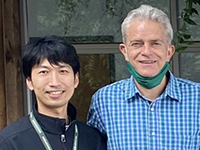 UAB Department of Neurosurgery Professor Erwin G. Van Meir, Ph.D. and Postdoctoral student, Takahiro Yamamoto, recently published a manuscript titled "Mice lacking full-length Adgrb1 (Bai1) exhibit social deficits, increased seizure susceptibility, and altered brain development" in Experimental Neurology. This collaborative study with Emory University demonstrated an important role for adhesion GPCR BAI1 (ADGRB1) in the brain.
UAB Department of Neurosurgery Professor Erwin G. Van Meir, Ph.D. and Postdoctoral student, Takahiro Yamamoto, recently published a manuscript titled "Mice lacking full-length Adgrb1 (Bai1) exhibit social deficits, increased seizure susceptibility, and altered brain development" in Experimental Neurology. This collaborative study with Emory University demonstrated an important role for adhesion GPCR BAI1 (ADGRB1) in the brain.
About the study
According to researchers, the adhesion G protein-coupled receptor BAI1 plays an important role in suppressing angiogenesis, mediating phagocytosis, and acting as a brain tumor suppressor. BAI1 is also a critical regulator of neural development and interacts with several autism-relevant proteins. However, little is known about the relationship between altered BAI1 function and clinically relevant phenotypes.
Yamamoto, Van Meir, and colleagues studied the effect of reduced expression of full-length Bai1 on behavior, seizure susceptibility, and brain morphology in mice engineered to lack Bai1 expression.
Throughout the study, social behavior, anxiety, repetitive behavior, locomotor function, and seizure susceptibility were assessed, and concluded that mice who lacked the Bai1gene showed significant social behavior deficits and increased vulnerability to seizures.
In addition, researchers also found that the mice also showed delayed growth and reduced brain weight. Furthermore, reduced neuron density and increased apoptosis during brain development were observed in the hippocampus, while levels of astrogliosis and microgliosis were comparable to normal littermates.
"These results show that reduced levels of full-length Bai1 are associated with a broad range of clinically relevant phenotypes supporting further study of BAI1 in human disease," says Van Meir.
All study authors included:
- Fu Hung Shiu
- Jennifer C.Wong
- Takahiro Yamamoto
- Trisha Lala
- Ryan H.Purcell
- Sharon Owino
- Dan Zhu
- Erwin G.Van Meir
- Randy A. Hall
- Andrew Escayg